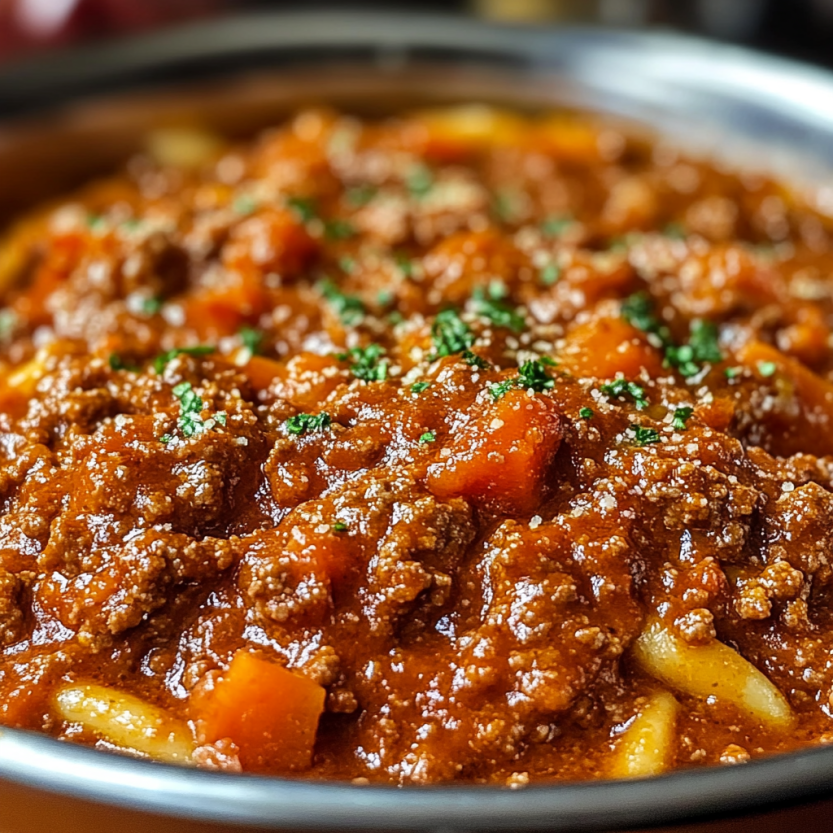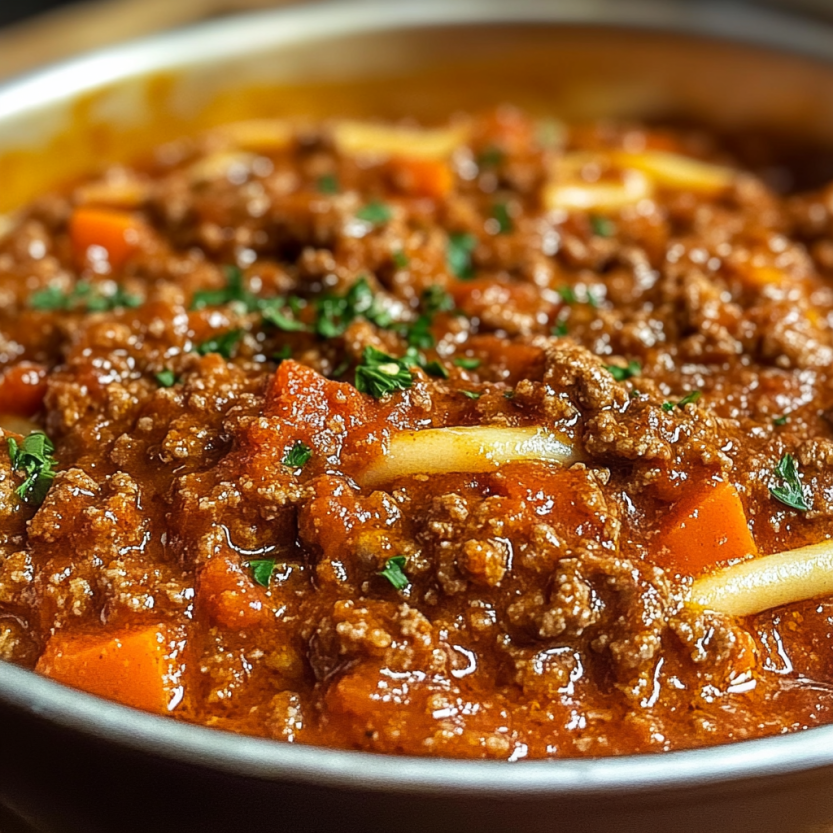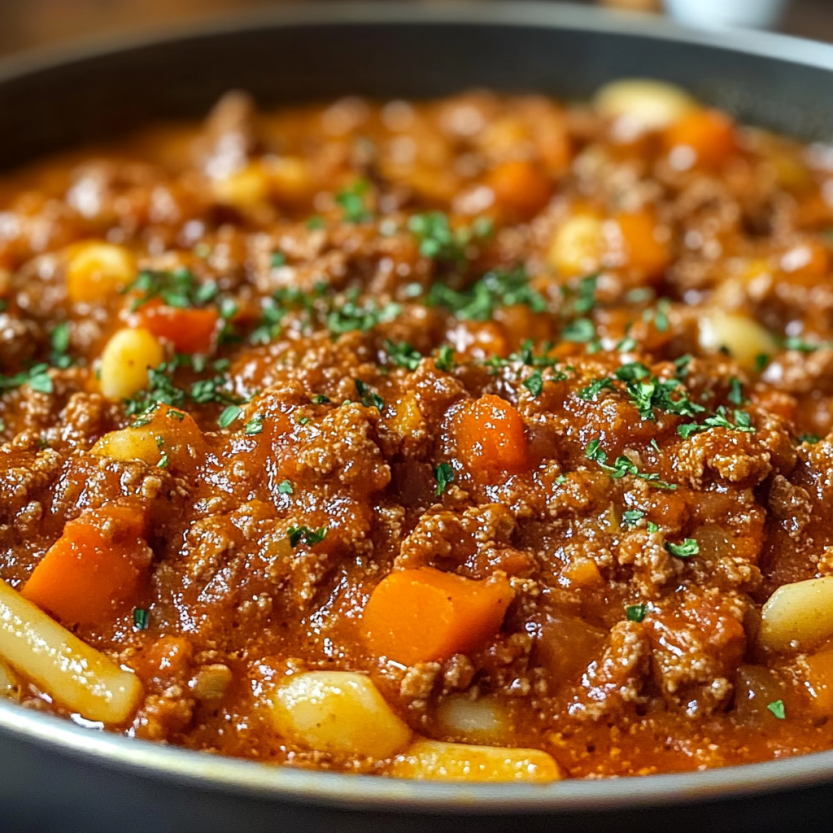 Save
Save
This hearty homemade Bolognese sauce transforms simple ingredients into a rich, comforting meal that tastes like it came straight from an Italian grandmother's kitchen. After years of perfecting this recipe, I've created a sauce that balances meat, aromatics, and tomatoes into something truly special that my family requests weekly.
This recipe became my signature dish after I first made it for a dinner party years ago. Even my Italian friend's grandmother asked for the recipe, which I consider the ultimate compliment for a Bolognese sauce.
Ingredients
- 2 tablespoons olive oil: provides the base for sautéing and adds richness
- 1 pound ground beef: offers hearty texture and robust flavor
- 1/2 pound ground pork: brings a subtle sweetness and moisture
- 1 large finely chopped onion: creates essential aromatic foundation
- 2 finely chopped carrots: add natural sweetness and traditional flavor
- 2 finely chopped celery stalks: complete the classic mirepoix base
- 4 cloves minced garlic: infuses the sauce with aromatic complexity
- 2 tablespoons tomato paste: concentrates umami and deepens color
- 28 oz can crushed tomatoes: provides the perfect texture
- 1 cup milk or cream: creates silkiness and balances acidity
- 1 cup red wine: adds complexity and helps tenderize the meat
- 2 bay leaves: contribute subtle herbal notes during the simmer
- Dried oregano and thyme: bring classic Italian flavors
- Salt and pepper: to taste for proper seasoning
- Grated Parmesan for serving: adds savory finishing touch
Step-by-Step Instructions
- Sauté the Aromatics:
- Heat olive oil in a large, heavy-bottomed pot over medium heat until it shimmers but doesn't smoke. Add your finely chopped onion, carrots, and celery. Cook them slowly for 5-7 minutes, stirring occasionally, until they become soft and translucent. The vegetables should not brown but rather sweat and release their flavors into the oil. This aromatic base, known as soffritto in Italian cooking, creates the foundation for the entire sauce.
- Incorporate the Garlic:
- Add the minced garlic to the softened vegetables and stir continuously for about 1-2 minutes. You'll smell the wonderful aroma as the garlic releases its essential oils. Be careful not to burn the garlic as it will become bitter. Look for it to become fragrant and just slightly golden.
- Brown the Meat:
- Add both ground beef and ground pork to the pot with the aromatics. Use a wooden spoon to break the meat into small pieces as it cooks. Continue breaking up any clumps to ensure even browning. Cook for about 8-10 minutes until all the meat has lost its pink color and begins to develop some caramelization around the edges. This caramelization creates rich flavor compounds essential to an authentic Bolognese.
- Deglaze with Wine:
- Pour the red wine into the pot, scraping the bottom vigorously with your wooden spoon to release all the flavorful browned bits. Allow the wine to simmer actively for 3-5 minutes until it reduces by about half and the alcohol has cooked off. The aroma will shift from sharp alcohol to sweet and rich as this happens.
- Add Tomato Paste:
- Stir the tomato paste into the meat mixture and cook for 1-2 minutes until it darkens slightly and becomes fragrant. This brief caramelization of the tomato paste develops umami flavors and helps deepen the sauce's color and richness.
- Combine All Ingredients:
- Add the crushed tomatoes, milk or cream, bay leaves, oregano, thyme, salt, and pepper to the pot. Stir thoroughly to incorporate all ingredients into a uniform mixture. The milk will initially create a slightly unusual color, but this will blend beautifully as it cooks.
- Slow Simmer:
- Bring the sauce to a gentle simmer with small bubbles breaking the surface. Reduce the heat to low, cover the pot with a lid slightly ajar to allow some evaporation, and let it simmer for 1.5-2 hours. Stir every 20-30 minutes to prevent sticking and to check consistency. During this time, the sauce will reduce, concentrate in flavor, and develop its signature velvety texture.
- Final Adjustments:
- Taste the sauce and adjust seasonings with additional salt and pepper if needed. The flavors should be deep, rich, and well-balanced. Remove the bay leaves before serving. If the sauce seems too thick, you can add a small amount of pasta water to reach your desired consistency.
 Save
Save
The milk in this recipe might seem unusual to some, but it's actually a traditional technique I learned from an Italian chef. It breaks down the meat proteins, creating an incredibly tender texture while balancing the acidity of the tomatoes and wine. Every time I add it to the pot, I remember his passionate explanation about how this simple ingredient transforms the entire sauce.
The Perfect Pasta Pairing
Bolognese sauce works best with pasta shapes that can catch and hold the thick sauce. Traditional pairings include tagliatelle, pappardelle, or fettuccine, whose wide, flat surfaces provide the perfect canvas. Rigatoni and penne are excellent tube pasta alternatives as their ridges and hollow centers trap the sauce beautifully. Authentic Italian tradition suggests cooking the pasta slightly undercooked, then finishing it by simmering briefly in the sauce to allow the pasta to absorb the flavors.
 Save
Save
Storage and Make-Ahead Tips
This Bolognese sauce actually improves with time as the flavors continue to develop and meld together. Store leftovers in an airtight container in the refrigerator for up to 4 days. For longer storage, portion the cooled sauce into freezer-safe containers, leaving a half-inch headspace for expansion, and freeze for up to 3 months. Thaw overnight in the refrigerator before reheating gently on the stovetop with a splash of water or broth to loosen the consistency if needed.
Customizing Your Bolognese
While this recipe presents the classic approach, Bolognese sauce welcomes thoughtful variations. For a lighter version, substitute ground turkey or chicken for the beef and pork. If you prefer a dairy-free option, simply omit the milk and add a tablespoon of nutritional yeast for depth. Vegetarians can create a satisfying alternative using a mixture of mushrooms, lentils, and walnuts finely chopped to mimic the texture of ground meat. Each variation maintains the spirit of Bolognese while accommodating dietary preferences.
Recipe Questions
- → Can I make Bolognese sauce ahead of time?
Yes, Bolognese sauce actually improves with time as flavors continue to develop. You can make it 1-3 days in advance and refrigerate in an airtight container. It also freezes beautifully for up to 3 months.
- → What pasta works best with Bolognese sauce?
Traditional Italian pairings include tagliatelle, pappardelle, or fettuccine as the flat, wide surfaces hold the thick sauce well. However, it's also commonly served with spaghetti, rigatoni, or penne.
- → Can I substitute the meat in Bolognese sauce?
While traditional Bolognese uses beef and pork, you can substitute with ground turkey, chicken, or even plant-based alternatives. Keep in mind this will change the flavor profile and may require adjusting seasoning.
- → Why add milk to Bolognese sauce?
Milk adds richness, helps tenderize the meat, and mellows the acidity of the tomatoes. It's a traditional ingredient in authentic Bolognese that creates a silkier texture and more complex flavor.
- → How can I make my Bolognese sauce less acidic?
The milk already helps reduce acidity, but you can also add a pinch of sugar or baking soda if needed. Longer cooking times also naturally mellow acidity, which is why the 2-hour simmer is important.
- → Can I make Bolognese sauce in a slow cooker?
Absolutely! After browning the vegetables and meat on the stovetop, transfer everything to a slow cooker with the remaining ingredients and cook on low for 6-8 hours or high for 3-4 hours.